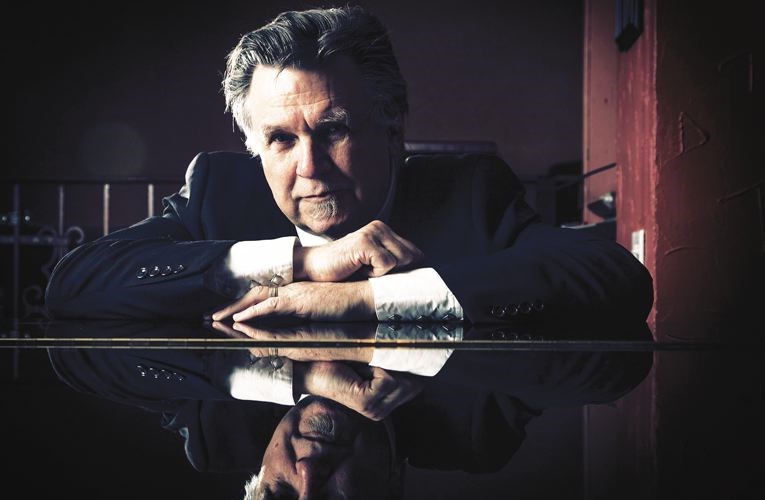The blues is something he has always played close to the vest.
There is a world of music available to the player of a piano. It is the foundation instrument for classical on through to new wave and even used in hiphop and metal. But for David Vest, the sound of the piano has always been tinged in blue and it's been that way since the TVs were only black-and-white and the streets was rusty brown all over his deep south homeland.
Vest grew up in the silt and swelter of post-war Alabama. It wasn't much of a place for economic prosperity or bustling cultural progress, but he remembered one name, one point of local pride, and it stuck to him like Coosa Valley mud on the shoes.
The name was W.C. Handy. The implication was the blues.
"I'm an old-school boogie-woogie piano player. The first time someone paid me to play was 1957 and I've been doing it ever since," said the award-winning captain of the keys. "When I do a show like the one I'll bring to Prince George, it's a whole retrospective of the blues. I'll be playing The Memphis Blues, the first song ever published that they call the blues, and that was by W.C. Handy. In Alabama we didn't have much, but we had him, we had the man who invented the blues."
Vest wrapped himself in that quintessential American - and for him, all local - form of music like a jacket. He was one of many, at that time, in that place, but he practised and focused on that style, and he was unrelenting. Eventually, he started to emerge as a talent, and kept emerging. He got to play with Big Joe Turner, he opened for Roy Orbison, Jimmy "T99" Nelson took him on as his touring pianist and is quoted as saying "I could go all around the world and never find another piano player like David Vest."
Vest was also handy at the composition table. He said, "I wrote the first song my buddy Tammy Wynette ever recorded, even before anyone called her Tammy Wynette," he said.
He kept his strings attached to the blues even when strings were no longer attached to piano keys. He admitted times got tough within his business starting in the 1980s onward, when synthesizers overwhelmed the melody. Keyboard players had plenty of work, but you got squeezed to the fringes if you insisted on felted wood hammers hitting steel wires.
He managed to persevere, partly because the blues is such a universally appreciated music form and partially because he moved to Canada.
"I came up here because of a Canadian and wow, when I got here all I could think of was 'how long has this been going on? This is pretty cool,'" he said. "This is just a great country, great culture, and everywhere I go, the talent level is really high. You're a nation that is good at music, all across, not just a few spotty places. You do music really well. I know people talk about hockey, but I think you're just as good at music."
One of his best friends is Kenny "Blues Boss" Wayne, another celebrated Canadian blues piano player. He is also friendly with his Victoria-area neighbour Michael Kaeshammer, the leader of Canada's next generation on the instrument. In fact those three were in the running together, along with contenders Duane Blackburn and Jesse O'Brien, for Piano/Keyboard Player of the Year at this year's Maple Blues Awards. Vest eventually prevailed. He won the same trophy last year, and again in 2013.
He and co-producer Gary Kendall were also up for Recording-Producer of the Year for Vest's album Devestatin' Rhythm. His 2012 album East Meets Vest was up for Record of the Year and his 2014 album Roadhouse Revelation earned a four star rating from Downbeat Magazine.
While we're talking trophy, Vest was also a nominee this year as Blues Artist of the Year at the Western Canadian Music Awards.
Vest didn't take long learning the history of the blues in Canada, and the great piano players of the northern blues scene over the years. Some of the late greats include Long John Baldry, Jane Vasey of Downchild Blues Band, multi-instrumentalist Norman "Dutch" Mason, and the pinnacle would undoubtedly be the iconic Oscar Peterson despite this legend's career emphasis on jazz
"Most of us in jazz and blues wander back and forth," said Vest. "I do a set I call Vest Plays Monk where I pay tribute to the great jazzman Thelonious Monk."
Vest is a remaining vestige of an era where "a piano player sometimes had to entertain an audience all night long all by himself," he said. He lived through thousands of miles and countless nights of bars and ballrooms, gathering material for song and story that he can now use like few others in Canada to knit into a concert experience.
Prince George audiences can see it for the first time on Saturday night at Art Space.
Vest will headline an event that also includes opening act Sean Robinson, the youngster who won this past year's Limelight Quest competition.
The show gets underway at 7:30 p.m. (doors open at 7 p.m.). Admission is $20 with proceeds going to the Blues Underground concert society that enables local audiences to have blues concerts and dances on a regular basis.



